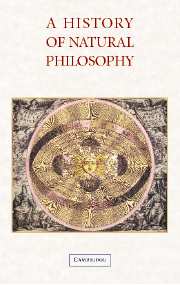Book contents
- Frontmatter
- Contents
- Preface
- 1 Ancient Egypt to Plato
- 2 Aristotle (384–322 BC)
- 3 Late Antiquity
- 4 Islam and the Eastward Shift of Aristotelian Natural Philosophy
- 5 Natural Philosophy before the Latin Translations
- 6 Translations in the Twelfth and Thirteenth Centuries
- 7 Natural Philosophy after the Translations: Its Role and Place in the Late Middle Ages
- 8 The Form and Content of Late Medieval Natural Philosophy
- 9 The Relations between Natural Philosophy and Theology
- 10 The Transformation of Medieval Natural Philosophy from the Early Modern Period to the End of the Nineteenth Century
- Conclusion
- Bibliography
- Index
5 - Natural Philosophy before the Latin Translations
Published online by Cambridge University Press: 05 June 2012
- Frontmatter
- Contents
- Preface
- 1 Ancient Egypt to Plato
- 2 Aristotle (384–322 BC)
- 3 Late Antiquity
- 4 Islam and the Eastward Shift of Aristotelian Natural Philosophy
- 5 Natural Philosophy before the Latin Translations
- 6 Translations in the Twelfth and Thirteenth Centuries
- 7 Natural Philosophy after the Translations: Its Role and Place in the Late Middle Ages
- 8 The Form and Content of Late Medieval Natural Philosophy
- 9 The Relations between Natural Philosophy and Theology
- 10 The Transformation of Medieval Natural Philosophy from the Early Modern Period to the End of the Nineteenth Century
- Conclusion
- Bibliography
- Index
Summary
Aristotle's natural philosophy and Greek science generally did not begin to enter Western Europe until the middle of the twelfth century. Before that time, only a minuscule part of Greek science and natural philosophy was available in the West. The Romans had not been sufficiently interested in such subjects to translate relevant Greek texts into Latin. But some Roman authors wrote treatises that modern scholars would regard as primarily concerned with natural philosophy. Among those in this group who have left extant treatises, the most famous are Lucretius (ca. 95–ca. 55 bc), Seneca (ca. 4 bc–ad 65), and Pliny the Elder (ca. ad 23–79).
ROMAN AUTHORS
The fame of Lucretius derives from his great poem, On the Nature of Things, which presents a picture of nature based on the atomic theory of Epicurus (341–270 bc), a Greek philosopher. Lucretius dealt with many topics, but the most important was his cosmic vision based on an assumption of an infinity of worlds, each composed of atoms moving in an infinite void space. He assumed that each world comes into being by a chance coming-together of atoms in the void; eventually each world passes away when its atoms dissociate and move into the void to form parts of other worlds. Lucretius was largely ignored by medieval Christianity, because of his attacks on religion and his denial of a created world, as we see in his statement that “our starting-point will be this principle: Nothing can ever be created by divine power out of nothing.”
- Type
- Chapter
- Information
- A History of Natural PhilosophyFrom the Ancient World to the Nineteenth Century, pp. 95 - 129Publisher: Cambridge University PressPrint publication year: 2007



